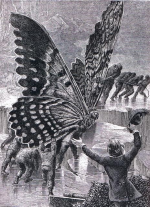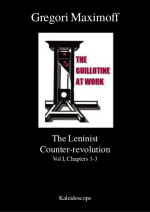Latest entries
Errico Malatesta
Anarchists have forgotten their principles
At the risk of passing as a simpleton, I confess that I would never have believed it possible that Socialists—even Social Democrats—would applaud and voluntarily take part, either on the side of the Germans or on the Allies, in a war like the one that is at present devastating Europe. But what is there to say when the same is done by Anarchists—not numerous, it is true, but having amongst them comrades whom we love and respect most?
Mar 11, 2017 Read the whole text...
Alfredo M. Bonanno
Towards insurrection
To launch a struggle against a precise aspect of power that is oppressing us, against a repressive structure under construction like the maxi-prison, is to pose the question of destruction. Because that’s the only way to put a final end to the structure in question. To believe that an enormous project such as the maxi-prison can be prevented by the gentle voice of petitions and legalist opposition is not only to deceive oneself but also everyone else, all the oppressed and excluded. No, such a struggle must pose the question of insurrection: stopping the progression of power by force and self-organisation. But how pose this question? With the aid of attempts if not similar, at least moved by a similar will in the past, comrade Alfredo M. Bonanno will throw some light on this crucial question.
Mar 11, 2017 Read the whole text...
Peter Kropotkin
The Great French Revolution 1789–1793
Kropotkin’s work on the French Revolution is without doubt one of the fundamental interpretations of events that were to transform the destiny of humanity. Its importance lies in two premises: the design of a revolutionary development that is different and more significant than that usually suggested by bourgeois historians, and the individuation of the first symptoms of the current of thought and action which, a century later, was to take the name of anarchism.
Mar 4, 2017 Read the whole text...
Max Sartin, Wolfi Landstreicher, Dominique Misein, Adonide
This is What Democracy Looks Like
One would think that a political doctrine and system that was propagated by the bourgeoisie in their rise to power, that is promoted world-wide by the Western ruling class and that has only existed in its so-called “pure” form on the backs of slaves, would at least be suspect in the eyes of those who oppose the present social order. But such is not the case.
Mar 4, 2017 Read the whole text...
Dominique Karamazov
The Poverty of Feminism
We see in The Poverty of Feminism how feminism, in spite of its emancipatory and radical airs, remains in the area of capitalist society and even becomes guardian of traditional female alienation.
Mar 1, 2017 Read the whole text...
Nestor Makhno
The Russian Revolution in the Ukraine
(March 1917 — April 1918)
Although the Russian anarchists of the past are still alive in our hearts today, their actual historical and human experiences seem far off in the night of time. We are talkning about only a few decades, yet it is as though the dust of centuries has piled up on these events, preventing us from understanding them. Always victorious in battle, Makhno appears as a fearless knight galloping invincible at the head of the Ukrainian insurgents, first against the white Russians of Denikin or Wrangel, then against Trotsky’s Red Army.
Feb 27, 2017 Read the whole text...
Emma Goldman
Jealousy
No one at all capable of an intense conscious inner life need ever hope to escape mental anguish and suffering. Sorrow and often despair over the so-called eternal fitness of things are the most persistent companions of our life. But they do not come upon us from the outside, through the evil deeds of particularly evil people. They are conditioned in our very being; indeed, they are interwoven through a thousand tender and coarse threads with our existence.
Feb 26, 2017 Read the whole text...
Charles Reeve, Sylvie Deneuve, Marc Geoffroy
Beyond the Balaclavas of South East Mexico
Books, conferences, videos, T-shirts, stickers, marches, committees and benefits abound, showing the many expressions of what has been defined as ‘the international of hope’. Yet no critique has been published on ‘insurgent Chiapas’ and the Zapatista National Liberation Army from the subversive point of view. Many anarchists have also given their contribution, without a word of criticism. Why is this?
Feb 26, 2017 Read the whole text...
Gregori Maximov
The Guillotine at Work
The Leninist counter-revolution (Chapters 1–3)
Originally published in 1940 in two volumes, this is the (partly eyewitness) account of the Leninist terror inflicted upon Russia. Maximoff, a life-long anarchist, fought in the Russian Revolution, organized with the metal-workers, and was imprisoned by Lenin’s secret police in 1920 when he refused to join the Red Army (he was happy to fight the Whites, but not put down workers' and peasants' uprisings). Exiled, he wrote this incredible volume, in English. Over the course of nearly 400 pages, he recounts not only the Leninist terror and reaction against the popular revolution, but shows how the actions of Stalin followed deliberately in his master, and mentor’s, footsteps.
Feb 24, 2017 Read the whole text...
Daniela Carmignani — Pierleone Porcu — Aldo Perego — Alfredo M. Bonanno — Massimo Passamani
Revolutionary Solidarity
The concept of solidarity is not only used and abused by the various reformist syndicalist and humanitarian movements and even power itself, it is also sadly emptied of any content by many anarchists. The levelling is such as to reveal a symbolic attitude worthy of the Church but which allows us to put our conscience at rest.
Feb 24, 2017 Read the whole text...
Series
Fragments
Work in Progress
Anarchist Pocketbooks
Kaleidoscope
Anarchist Pamphlets
Bratach Dubh
Detritus
Drafts
Déjà vu
Insurrection (PDF)
Contact
e-mail: elephanteditions [at] riseup.net
Distributions
In Europe, Elephant Editions are distributed by Active Distribution
In the United States, Elephant editions are distributed by AK Press
In Italy, Elephant Editions are distributed by Edizioni Anarchismo
Other distributions please get in touch.










